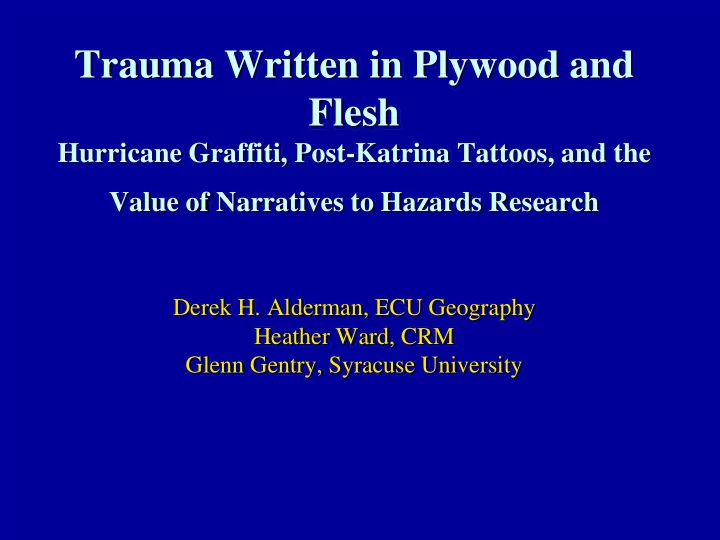

Trauma Written in Plywood and Flesh Hurricane Graffiti, Post-Katrina Tattoos, and the Value of Narratives to Hazards Research Derek H. Alderman, ECU Geography Heather Ward, CRM Glenn Gentry, Syracuse University
The Importance of Narratives • What narratives do ordinary people construct about their hurricane experiences? How are these narratives not just “personal stories” but also shared community discourses? • What role do narratives play in coping and coming to terms with hurricanes and their impact? How are narratives potentially therapeutic? • How can a critical use of narratives advance hazards research? What previously ignored narrative forms are worth reading and analyzing by hazards scholars?
Visually Evocative Narratives • Hurricane Graffiti (Alderman and Ward 2008) – Practical Communication Tool – Deeper Cultural Importance – Indicator of tensions, needs, and attitudes with communities • Post-Katrina Tattoos (Gentry and Alderman 2007) – Tattoos as memorials – Express trauma and place attachment – Tattoos are ways of retelling Katrina stories
Hurricane Graffiti Study • Identify specific themes evident in hurricane graffiti inscriptions in the southeastern US (2004 & 2005) – Visual content analysis – Collected 100 archived news photographs of hurricane graffiti – Pre- and Post-Hurricane Graffiti – Source: AP Multimedia Archive • Each photograph accompanied by a descriptive caption
7 Major Hurricane Graffiti Themes • Graffiti as: – (1) history – (2) defiance – (3) desperation – (4) territoriality – (5) humor – (6) politics – (7) prayer • These are just a few of many potential interpretive veins
Graffiti as History: Resiliency? Hotel in Daytona Beach, FL (Sept.2004)
Graffiti as Defiance
Graffiti as Desperation Business owner in Fort Pierce (FL) uses graffiti to plead for the restoration of utilities and to document degree of isolation and exclusion.
Graffiti as Indicator of Evacuation Convenience Store in Gulf Breeze (FL)
Graffiti as Territoriality Family in Port Charlotte (FL) guard their home against the threat of looters after landfall of Charley in 2004.
Anger Toward Disaster Tourists
Graffiti as Humor • Use humor to make uncontrollable natural force appear more familiar and perhaps less threatening
Graffiti as Political Commentary
Graffiti as Prayer Oyster House restaurant in Spanish Fort (AL) preparing for Hurricane Dennis
Graffiti as Prayer Religious graffiti painted after Hurricane Charley hit Punta Gorda (FL) in 2004
Future Applications of Graffiti • Use graffiti to unpack other hurricane narratives and stories –Survey/Interview graffiti authors –Photo-elicitation –Graffiti board at public site
Community members in Ft. Lauderdale (FL) inscribe Bible verses and other comments on plywood coverings during the threat of Hurricanes Frances and Ivan
Hurricane Tattoo Study • Visited New Orleans in summer and fall of 2006 • Interviewed tattoo artists – Katrina victims who give and get storm-inspired tattoos • How are tattoos used to mark and cope with painful memories and stories?
Tom: X Marks the Spot • Rode out Katrina in 9 th Ward with pregnant wife • Reference to rescue X graffiti • Refusal to forget storm and impact • Marks the trauma of keeping daughter alive
Tattoos express personal experience Tom : “My daughter was born a couple of weeks after Katrina. This is part of her legacy. She has no idea how hard it was to keep her alive, the struggle it was without electricity, clean water, diapers…nothing man. I mean we were just trying to keep her alive. She was just so little…” Tattoos provoke collective memory Tom : “I cannot go anywhere without people staring, or pointing [at my tattoo], and people always have a story. Man, everybody. I got this because it is too important to forget. I can’t, it is right here.”
The Value of Narratives • Narratives are about gaining insight into a diversity of voices (not a single dominant, official interpretation) • Narratives are both personal and social in nature (not just the opinion of one person) • Narratives build upon and are linked to other narratives • Narratives are political—a way of resisting isolation and marginalization (coping mechanism)
Recommend
More recommend